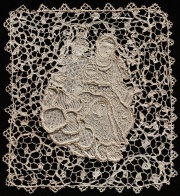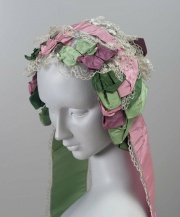Difference between revisions of "Lace"
(username removed) |
|||
| (3 intermediate revisions by 3 users not shown) | |||
| Line 1: | Line 1: | ||
| − | [[File:81.18-SC186902.jpg|thumb| | + | [[File:81.18-SC186902.jpg|thumb|17th c. Italian lace<br>MFA# 81.18]] |
== Description == | == Description == | ||
| + | [[File:51.343-SC109616.jpg|thumb|Lace cap<br>MFA# 51.343]] | ||
| + | A decorative fabric consisting of an openwork pattern of threads. Early samples of decorative knotted cords have been found in Peru dating from about 2000 BCE. Modern lacemaking techniques originated in Europe with two primary kinds of laces: needlepoint and bobbin. Needlepoint lace derived from embroidery while bobbin lace is a form of weaving or macramé. Needlepoint, or point, laces are hand embroidered with a needle and, typically, a buttonhole stitch. Point laces were first made in Italy in the early 16th century, then quickly spread through Europe and are still being made in Ireland and Belgium. Bobbin, or pillow, lace is made with spools of thread that are wound around pins then plaited, interlaced, twisted, and/or knotted. Bobbin laces were first made by hand in the mid-16th century, but were replaced by machine-made bobbin mesh by the mid-1800s. [[Linen]] was the most used thread for lace in Europe before 1800. After that time, [[cotton]] became more widespread. Other threads used in lace include: [[silk]], [[hair]], [[wool]], metal, and, more recently, synthetic fibers. | ||
| − | |||
| − | |||
| − | |||
== Synonyms and Related Terms == | == Synonyms and Related Terms == | ||
| Line 13: | Line 12: | ||
[[media:download_file_260.pdf|Common Types of Lace]] | [[media:download_file_260.pdf|Common Types of Lace]] | ||
| − | + | ==Resources and Citations== | |
| − | |||
| − | |||
| − | |||
| − | == | ||
| − | * | + | * Hermann Kuhn, ''Conservation and Restoration of Works of Art and Antiquities'', Butterworths, London, 1986 |
| − | * | + | * Hoechst Celanese Corporation, ''Dictionary of Fiber & Textile Technology'' (older version called Man-made Fiber and Textile Dictionary, 1965), Hoechst Celanese Corporation, Charlotte NC, 1990 |
| − | * | + | * Rosalie Rosso King, ''Textile Identification, Conservation, and Preservation'', Noyes Publications, Park Ridge, NJ, 1985 |
| − | * | + | * Random House, ''Webster's Encyclopedic Unabridged Dictionary of the English Language'', Grammercy Book, New York, 1997 |
* ''The American Heritage Dictionary'' or ''Encarta'', via Microsoft Bookshelf 98, Microsoft Corp., 1998 | * ''The American Heritage Dictionary'' or ''Encarta'', via Microsoft Bookshelf 98, Microsoft Corp., 1998 | ||
| − | * ''Encyclopedia Britannica'', http://www.britannica.com Comment: "Lace." | + | * ''Encyclopedia Britannica'', http://www.britannica.com Comment: "Lace." Accessed 30 July 2004 . |
| − | * Art and Architecture Thesaurus Online, | + | * Art and Architecture Thesaurus Online, https://www.getty.edu/research/tools/vocabulary/aat/, J. Paul Getty Trust, Los Angeles, 2000 |
[[Category:Materials database]] | [[Category:Materials database]] | ||
Latest revision as of 11:26, 6 October 2022
Description
A decorative fabric consisting of an openwork pattern of threads. Early samples of decorative knotted cords have been found in Peru dating from about 2000 BCE. Modern lacemaking techniques originated in Europe with two primary kinds of laces: needlepoint and bobbin. Needlepoint lace derived from embroidery while bobbin lace is a form of weaving or macramé. Needlepoint, or point, laces are hand embroidered with a needle and, typically, a buttonhole stitch. Point laces were first made in Italy in the early 16th century, then quickly spread through Europe and are still being made in Ireland and Belgium. Bobbin, or pillow, lace is made with spools of thread that are wound around pins then plaited, interlaced, twisted, and/or knotted. Bobbin laces were first made by hand in the mid-16th century, but were replaced by machine-made bobbin mesh by the mid-1800s. Linen was the most used thread for lace in Europe before 1800. After that time, Cotton became more widespread. Other threads used in lace include: Silk, Hair, Wool, metal, and, more recently, synthetic fibers.
Synonyms and Related Terms
dentelle (Fr.); encaje (Esp.); puntilla (Esp.); kant (algemeen) (Ned); needle lace; needlepoint lace; point lace; bobbin lace; pillow lace; machine lace;
Comparisons
Resources and Citations
- Hermann Kuhn, Conservation and Restoration of Works of Art and Antiquities, Butterworths, London, 1986
- Hoechst Celanese Corporation, Dictionary of Fiber & Textile Technology (older version called Man-made Fiber and Textile Dictionary, 1965), Hoechst Celanese Corporation, Charlotte NC, 1990
- Rosalie Rosso King, Textile Identification, Conservation, and Preservation, Noyes Publications, Park Ridge, NJ, 1985
- Random House, Webster's Encyclopedic Unabridged Dictionary of the English Language, Grammercy Book, New York, 1997
- The American Heritage Dictionary or Encarta, via Microsoft Bookshelf 98, Microsoft Corp., 1998
- Encyclopedia Britannica, http://www.britannica.com Comment: "Lace." Accessed 30 July 2004 .
- Art and Architecture Thesaurus Online, https://www.getty.edu/research/tools/vocabulary/aat/, J. Paul Getty Trust, Los Angeles, 2000

